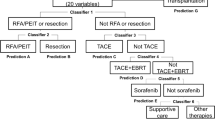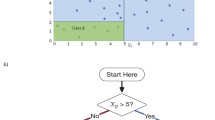Abstract
This paper presents the use of data mining tools to derive a prognostic model of the outcome of resectable hepatocellular carcinoma. The main goal of the study was to summarize the experience gained over more than 20 years by a surgical team. To this end, two decision trees have been induced from data: a model M1 that contains a full set of prognostic rules derived from the data on the basis of the 20 available factors, and a model M2 that considers only the two most relevant factors. M1 will be used to explicit the knowledge embedded in the data (externalization), while the model M2 will be used to extract operational rules (socialization). The models performance has been compared with the one of a Naive Bayes classifier and have been validated by the expert physicians. The paper concludes that a knowledge management perspective improves the validity of data mining techniques in presence of small data sets, coming from severe pathologies with relative low incidence. In these cases, it is more crucial the quality of the extracted knowledge than the predictive accuracy gained.
Preview
Unable to display preview. Download preview PDF.
Similar content being viewed by others
References
Nonaka I., Takeuchi H., The Knowledge-creating company, University Press, Oxford UK 1995.
Pazzani M.J., Knowledge discovery from data?, IEEE Intelligent Systems, 10–13, March–April 2000.
Kukar M., Besic N., Konomenko I., Auersperg M., Robnik-Sikonia M., Prognosing the survival time of the patients with the anaplastic thyroid carcinoma with machine learning, in: Intelligent Data Analysis in Medicine and Pharmacology, N. Lavrac, E. Keravnou, B. Zupan, 116–129, Kluwer, Boston, 1997.
Lise M., Bacchetti S., Da Pian P.P., Nitti D., Pilati P.L., Pigato P., Prognostic factors affecting long term outcome after liver resection for hepatocellular carcinoma, Cancer 82 (1998) 1028–1036.
Bacchetti S., Toffolo G., Volpato M., Da Pian P., Nitti D., Cobelli C., Lise M., Outcome prediction in patients with resectable hepatocellular carcinoma; comparison of a Multivariate score model and a Bayesian Model (submitted for publication).
Ramoni M., Sebastiani P., An introduction to the robust Bayesian classifier, KMI-TR-79, the Open University, UK, 1999.
Dash M., Liu H., Features Selection for Classification, Intelligent Data Analysis, 1997, http://www.elsevier.com/locate/ida.
Quinlan, J.R.: C4.5 Program for Machine Learning, Morgan Kaufmann, San Mateo CA (1994)
See5 Release 1.13, http://www.rulequest.com
Robust Bayesian Classifier (ROC), http://kmi.open.ac.uk/project/bkd
Duda R.O., Hart P.E., Pattern classification and scene analysis, Wiley, New York, 1973.
Mitchell T.M.: Machine Learning, McGraw-Hill, New York, 1997
Hamamoto I., Okada S., Hashimoto T., Wakabayashi H., Maeba T., Maeta H.: Prediction of the early prognosis of the hepatectomized patients with hepatocellular carcinoma with a neural network, Comput Biol Med 25 (1995) 49–59.
Gamberger D., Lavrac N., Jovanoski V., High confidence association rules for medical diagnosis, Proc. IDAMAP’ 99 workshop, 42–51., 1999.
Mani S., Shankle W.R., Dick M.B., Pazzani M.J.: Two stage Machine Learning model for guideline development,, Artif Intell Med, 16 (1999) 51–71.
Zupan B., Demsar J., Kattan M.W., Beck R.J., Bratko I: Machine Learning for survival analysis: a case of study on recurrence of prostate cancer, Artif Intell Med, 20 (2000) 59–75.
Author information
Authors and Affiliations
Editor information
Editors and Affiliations
Copyright information
© 2001 Springer-Verlag Berlin Heidelberg
About this paper
Cite this paper
Bellazzi, R., Azzini, I., Toffolo, G., Bacchetti, S., Lise, M. (2001). Mining Data from a Knowledge Management Perspective: An Application to Outcome Prediction in Patients with Resectable Hepatocellular Carcinoma. In: Quaglini, S., Barahona, P., Andreassen, S. (eds) Artificial Intelligence in Medicine. AIME 2001. Lecture Notes in Computer Science(), vol 2101. Springer, Berlin, Heidelberg. https://doi.org/10.1007/3-540-48229-6_5
Download citation
DOI: https://doi.org/10.1007/3-540-48229-6_5
Published:
Publisher Name: Springer, Berlin, Heidelberg
Print ISBN: 978-3-540-42294-5
Online ISBN: 978-3-540-48229-1
eBook Packages: Springer Book Archive




